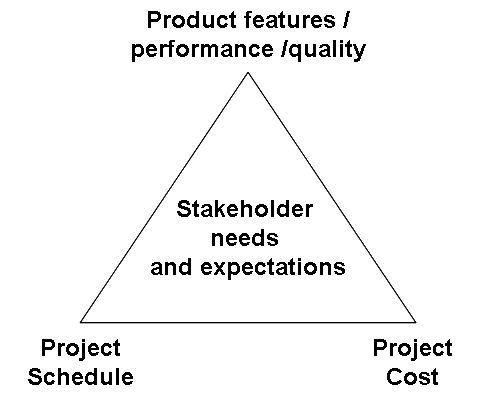The real “law” is that project managers must BALANCE good, fast, and cheap and stakeholder needs and expectations. When the balance is lost, project stakeholders suffer.
Think of the good/fast/cheap placed at the three vertices of an equilateral triangle. However, instead of using good/fast/cheap use the terms “product quality, features, or performance”, “Project Scheduleâ and âProject Cost”

Now imagine some project stakeholder decides, for whatever reason, to “pull” on one of those vertices. In order for the triangle to maintain its triangular shape, one or both of the remaining sides must grow or shrink. How many times was the âcostâ side of the Big Digâs triangle pulled?
Good project managers know that if the project budget is cut, then they must give up on either schedule – the project will take longer, or product quality – the product of the project will be less than originally planned, or both. At a minimum, the PM must tell the stakeholders the impact of their changes.
In public works projects, there are all kinds of stakeholders concerned with the project “cost” side of the triangle, a whole bunch more concerned with the “schedule” side of the triangle, yet far fewer concerned with the “product quality” side of the triangle.
In effect the schedule focused and cost focused stakeholders outweigh (in both number and power) the product quality focused stakeholders and drive the project in a âcheap/fastâ direction. Guess what, the quality of the product suffers. If the triangle gets out of balance, stakeholders suffer.
To put it another way, concern over project cost and schedule killed Milena Delvalle.
Can you “blame” the project managers? Ultimately, it is the PM’s fault. But who was the PM? Was it Parsons or Bechtel? Was it the Mayor? Governor? US Senate/House? Turnpike Authority? Public works projects, also âsufferâ from too many âcooksâ making the broth, responsibility is difficult to assign.
It is not hard to imagine A PM under intense cost pressure by government officials, taking a few short cuts. That same PM (or the replacement PM) under intense schedule pressure takes a few short cuts. Short cuts on top of short cuts result in an unsafe product. Who did all the pressuring? Tax payers, government officials, politicians running for office – lots and lots of people.
Who put the PM under intense “product quality” pressure? The question sounds silly. Why? Because it hardly ever happens. But the short answer is the regulatory boards like the NTSB (National Transportation Safety Board), the state and city construction inspectors and perhaps some auditors. It is obvious; the triangle becomes dangerously tipped to favor cost and schedule. Balance is lost killing a stakeholder.
Now Governor Romney steps in. What will he do?
Since the Big Dig Project is essentially over, he cannot help the project. While the project was underway, he should have played the role of product advocate. He did not. Instead, he will try to cover his ass (read: get ready for his presidential bid) by attempting to bring the Big Dig product up to its original specifications; the specifications that were so quickly jettisoned for cost and schedule savings.
Disgusting.
Mark
Tagged: Big Dig, project management, stakeholder expectations, public works projects, Massachusetts
Thanks for taking the time to give us your thoughts. I found very informative. I would give you a 6 if I could.
This is a very cogent way of saying what I’ve been trying to say ever since this became the hot topic of conversation.
<
p>
I too worked for a management company (not directly for any infrastructure projects, but something not too far off) and the client is just as much the reason for shortcuts, often, then anyone else.
<
p>
Also doesn’t help the quality of the product that the state (and the PM company as I recall) is forced to take the lowest bid by contractors, either.
Thanks. I take it as a true compliment coming from you. I’ve written and taught quite a bit on project management (http://www.oakinc.com, Maynard MA)
<
p>
Best,
Mark
<
p>
Your example further demonstrates my point that the Cost and Schedule sides of the triangle get far more attention than the product side of the triangle…
<
p>
Our bidding processes often institutionalize poor product performance.
<
p>
Mark